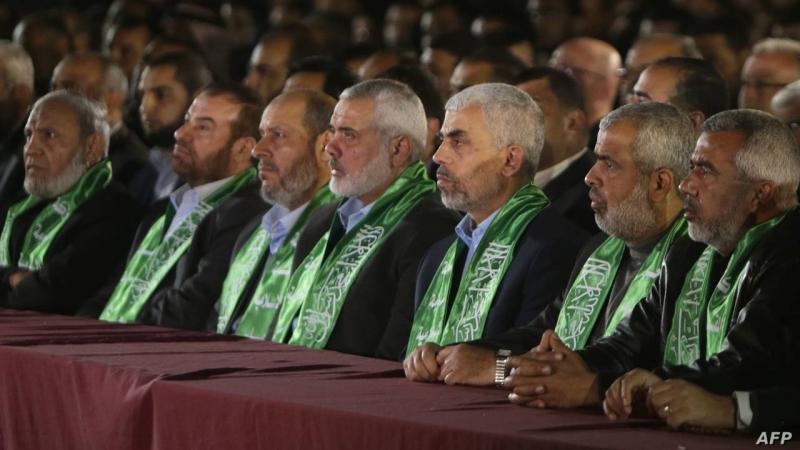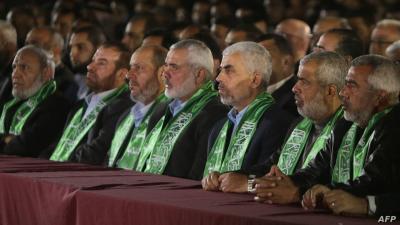Between the tunnels in Gaza and Hamas's political office abroad, there is a conflict simmering around two main issues: ending the war in Gaza and the future of the sector after the war.
Reports from Western sources indicate that a dispute has ignited between the political and military wings of Hamas, following secret negotiations by the political leadership of the movement with the Palestinian Authority without the knowledge of Hamas leader in Gaza, Yahya Sinwar. This is about how to govern the sector and the West Bank after the war and the political wing's willingness to join the Palestinian Liberation Organization and support negotiations under a national unity government to establish a Palestinian state. This has angered Sinwar, who is at the top of Israel's wanted list, demanding an immediate halt to the negotiations, especially since they suggest that Hamas's political faction is starting to plan for the post-conflict phase, marking a sharp turning point more than two months after the attack led by the movement on the Gaza periphery on October 7. Is it true that the walls of the war launched by Hamas and entered by Israel are starting to crumble on their owners? Can we genuinely talk about the "day after" the war on Gaza while experts say it is still in its early stages?
The approach to discussing the rift between the political and military wings of Hamas does not reflect the reality on the ground in Gaza. The conflict between Hamas, which aligned with the Iranian axis since 2017 after previously following al-Qaeda, and its military wing, the Qassam Brigades, predated the war with Islamic Jihad, which also operates under Iran's influence and takes orders from Khamenei.
Tony Nissi, head of the Committee for Implementing International Resolutions in Lebanon, points out that the two military forces in Gaza, Hamas and Islamic Jihad, are in constant conflict. He recalls how Hamas remained neutral last year when Israel conducted military operations against Islamic Jihad in Gaza, killing eight of its senior leaders. However, Hamas and Islamic Jihad orbit around Iran and receive financial, logistical support, and even orders from it, and they were partners on October 7. This military role of Islamic Jihad alongside Hamas has pushed it to elevate its demands regarding the share of control after the war in managing the sector and insisting on being a partner after previously being an appendage to Hamas.
Discussions among Hamas political leaders with first-tier leaders in the Palestinian Authority revolved around the first party's readiness to join the Palestinian Liberation Organization and support negotiations under a national unity government to establish a Palestinian state within the 1967 borders. However, on the other hand, Hamas insists on not abandoning its weapons or changing its stance towards Israel, which refuses to recognize it as long as the occupation continues.
"However, the 'negotiations' between Hamas's political wing and the Palestinian Authority have been ongoing since before the war," says Nissi, mentioning a project to unify the political authority of the Palestinian Authority with Fatah and the military authority with Hamas. Today, these talks are returning, sponsored by Doha and countries indirectly involved in the war, he notes.
Since the war's onset, the Palestinian Authority has been the sole representative of the Palestinians and remains so; even the final statement from the emergency Arab Islamic summit held last October in Saudi Arabia only mentioned the Palestinian Authority as the legitimate representative of the Palestinians. However, Israeli Prime Minister Benjamin Netanyahu continues to affirm his refusal to exit Gaza until the "complete elimination" of Hamas, also rejecting the Palestinian Authority's return to manage the sector and demanding international forces.
Among the options being considered by international community leaders is the establishment of a multinational peacekeeping force comprising Arab nations, which both Hamas and the Palestinian Authority reject. Another option is to reactivate the Palestinian Authority and its special security forces.
Netanyahu's position has paved the way for reviving negotiations between Hamas's political wing and the Palestinian Authority, according to Nissi, "but all this remains within the framework of a heartbeat monitoring process, and it is too early to talk about who will manage the Gaza Strip after the war since the battle is still in its early stages."
He adds, "The Gaza war has taught Israel and the United States a new lesson: that all the 'guaranteeing' countries of the armed militias present on the borders with Israel have been unable to protect them, and will not allow the clock to be turned back. More clearly, Israel will not accept any armed presence on Gaza's land. The opportunity presented to Israel in the war on Gaza after Hamas's offensive will not be repeated to protect its borders, thus insisting on that the authority managing the sector post-war should be subject to international community decisions."
Regarding Lebanon, Nissi asserts it is still under the microscope of war, evident from the shift in discussion from "Will the war expand?" to "When will the time come?" Will it be after Hamas's end in Gaza, or if the party refuses to withdraw 10 kilometers beyond the South Litani?
In summary, "We are still in the early stages, and the war is lengthy and complex, containing many details that unfold daily. What we see and hear today about negotiations between Hamas's political wing and the Palestinian Authority on one hand, and the rift between the military and political wings of the movement on the other, is part of it. The negotiations have not reached a conclusion, and Iran has not abandoned Hamas as was rumored," Nissi concludes.




